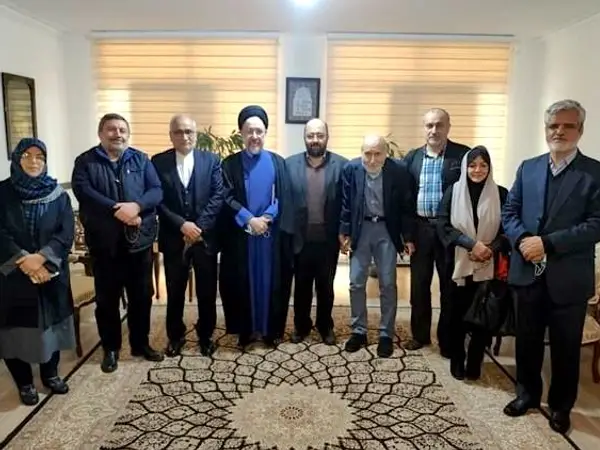Iran's reformists appear to be hopeful for a modest political comeback, naming the new leading members the Reform Front, their umbrella organization.
As Nameh news in Tehran has reported, the Reform Front earlier this week named 15 reformist politicians as its "real persons" alongside several political entities as the "legal entities” under the umbrella organization. The development coincided with the anniversary of the 1997 presidential election which brought the country's first reformist government to power.
The members include former front chief Behzad Nabavi, former deputy foreign minister Mohsen Aminzadeh, media figure Mohammad Reza Jalaipour, religious-nationalist activist Emad Behavar, former Tehran city council chief Mohsen Hashemi and Fakhrolsadat Mohtashamipour the wife of jailed former deputy interior Minister Mostafa Tajzadeh.
According to Nameh News, former President Mohammad Khatami is still the pivot of the reform camp, but he is not likely to dictate anything to reformists. Nabavi is more likely to be elected once again as the leader of the reform front. During the past two days, several leading reformist figures wrote articles in the Tehran press to shed light on the status of the reformists who were barred from the last parliamentary and presidential elections in Iran in 2020 and 2021.
It was the Guardian Council, a constitutional body vetting candidates and controlled by Iran’s ruler Ali Khamenei that barred hundreds of candidates with adequate explanation.
In a commentary in Etemad Online, Hamidreza Jalaipour made it clear that the protesters in Iran have shunned both reformists and conservatives in their slogans, but said: "To save the country, we need reforms rather than a regime change." He said, "The call for regime change has empowered Iran's authoritarian hardliners."
Jalaipour further explained that "The government needs to embrace reformists in order to save the country." He added that the reforms started by Khatami in 1997 have remained incomplete and it is time to revive the reformist ideas as the authoritarian hardliners have been cornered by the people.
Reformist theoretician Mohammad Reza Tajik said, "Reformists can no longer hope in change of policy through preaching and offering advice." He added that aiming to seize political power, Iran's reformists should seek to return the element of expediency to the Iranian political frameworks.
Tajik further pointed out that from a philosophical standpoint, the ideal of the Sharia is to observe the Muslims' expediency and to want what is most reasonable for them. The aim is in a nutshell to satisfy the citizens rather than seeking to serve the interests of the rulers.
Meanwhile, explaining matters in a more down to earth style, reformist activist Fayzopllah Arabsorkhi said in an interview that the government's behavior has instilled despair in the Iranian society. He added that there is no sign to indicate the government has any interest in changing its approach.
He added that there are at least ten parallel institutions that interfere with the legislative function of the parliament. Members of the parliament do not have any political power while the heads of the three government branches and numerous councils make all the decisions for the country and the people.
Arabsorkhi added that all conservative leaders are saying is that you might want other things, but what you want will not make any change in the elections. This attitude makes elections meaningless, he said.
In a report on the situation, Rouydad24 wrote that reformists are likely to become more active as we get closer to the election date in March and a list of candidates is most likely to come out of the left wing, The Islamic Revolution's Mojahedin Organization (IRMO), a party where Arabsorkhi, Nabavi and Tajzadeh come from. According to Rouydad24, IRMO the most influential reformist political organization and can be the driving force behind the reform camp's strategy for the next parliamentary and presidential elections.
